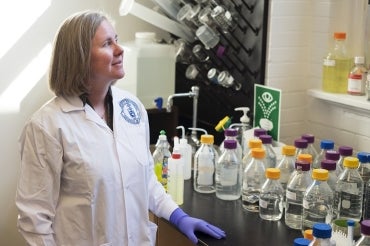Early Career Teaching Award spotlight: Q&A with physiologist Dawn Kilkenny

Published: March 22, 2017
Her students wouldn’t suspect it, but Dawn Kilkenny feels a little stage fright at the start of every academic year.
The reason?
“I want them to like the content as much as I do,” she told U of T News.
Kilkenny, an assistant professor, teaching stream at the Faculty of Applied Science & Engineering, started at U of T in 2008. In recent years, her main project at the university has been to revamp a biomedical teaching laboratory in the Lassonde Mining Building. She helped raise more than $2 million for new equipment and renovations.
A more than 60-inch wide smart board has now replaced the old whiteboard. While students once crowded around a desk at the front of the lab to watch demonstrations, they can now see experiments in real-time on monitors above their desks.
She teaches undergraduate biomedical engineering courses at U of T, including a core class on human anatomy and physiology, focusing on the nervous, cardiovascular, respiratory, renal and endocrine systems. Last year, she won a Wighton Fellowship, a national award recognizing excellence in undergraduate lab-based teaching at a Canadian engineering school, and this year she received an Early Career Teaching Award from U of T.
Kilkenny spoke to U of T News for a series spotlighting the winners of the Early Career Teaching Awards. The other winners this year are:
- Sanja Hinić-Frlog, assistant professor, teaching stream, in biology at University of Toronto Mississauga
- David Roberts, assistant professor, teaching stream, Innis College urban studies program, Faculty of Arts & Science
- Ashley Stirling, assistant professor, teaching stream in the Faculty of Kinesiology & Physical Education
What do you like most about teaching?
I like being immersed with students. I'm very practically driven in my teaching. I like the laboratory component, and most of what I do focuses on our teaching laboratory. I would say that's probably one of the biggest pieces where I've had an impact since I've been at U of T.
I'm fortunate in that I teach third year or higher so they're smaller classes. I actually go in the lab every time my students are in there. I may not be there the whole time, but I love to get right in there with them and see if they need any discussion, if they want to show me things, if they want to troubleshoot. I like that more intimate setting.
And I love when I see students in the class for whom this maybe isn't their favourite subject, and I bring them up to a point where they actually enjoy the course.
How do you do that?
I subconsciously take more time with them, to talk with them or engage them during a lecture. If they're not one of the students who will put their hand up, I'll try to start a discussion in the lab. I'll go to them if they won't come to me.
Which of your own teachers inspired you?
I had an instructor when I did my undergraduate degree in physiology at Western University, Marilyn Robinson. She was magnificent.
Dr. Edith Arany was a post-doctoral researcher at Western who had a tremendous impact on my career. She took me under her wing and spent a lot of time teaching me in the biological laboratory setting. I probably would not have survived, or achieved, my doctorate without her mentorship. Edith and I are still in touch and have recently collaborated on a research study.
What made them good teachers?
She (Robinson) was vibrant. She was engaging. She cared. You could go to her, and she was genuinely happy to see you and would stop what she was doing to help. I always remember thinking how wonderful she was, and I wanted to be like that.

Bobble heads of Francis Crick and James Watson, discoverers of the double-helix structure of DNA, decorate the desk of Dawn Kilkenny. She says they are a big hit with students who visit her during office hours (photo by Geoffrey Vendeville)
What do you hope students take away from your classes?
Apart from gaining relevant information that is going to move them forward with their career path, I hope that they get true enjoyment from something that maybe they weren't sure about when they started.
I teach core courses, and the students aren't all there because it's their favourite topic. It's because it's a requirement of the program.
I want them to be open to new things.
What do you do in your own time?
I have five children that range in ages from 5 to 16, and so I'm very busy with their school activities. My three older ones all play volleyball. We spend a lot of time at the Ontario Volleyball Association tournaments and at practices.
Can you explain your research?
We focus on diabetes. I look on the level of the beta cells, which are the cells that secrete insulin after you've eaten, and we look at the different mechanisms of signalling and how they change as diabetes progresses.
How were you as a student?
I wasn't at the top of the class but I was a strong student. But the irony of it, is when I finished my undergraduate degree, I applied to teachers college because I thought I would teach high school.
I did not get in. I was wait-listed.
In the interim when I was doing my fourth-year thesis my supervisor came to me and said what are your plans for the future. When I told him, he said, “Forget that. I will hire you right now if you will do your master’s.”
I hadn't even considered it, but I loved the research, the hands-on at the bench. I think that's why I love everything I do with our teaching facilities here. I know how much it meant to me, and how engaged I was. I want to make sure our students here get the same experiences and more.
Why did you go into teaching?
I've always enjoyed interacting with students. But even now I always get a little stage fright at the beginning of the year every September when I have a new class. It takes me a bit of time. I really do love interacting with small groups of people and that knowledge transfer.
I never thought professors got stage fright.
For the first couple of weeks in September, I'm always very nervous when I get up there. It's just, I want them to like the content as much as I do.
I know I'm never going to get a 100 per cent capture rate, but it's really nice when students come up at the end of the year and say, "I really loved this class. It was one of my favourite classes. I never thought about doing this and now I am."


